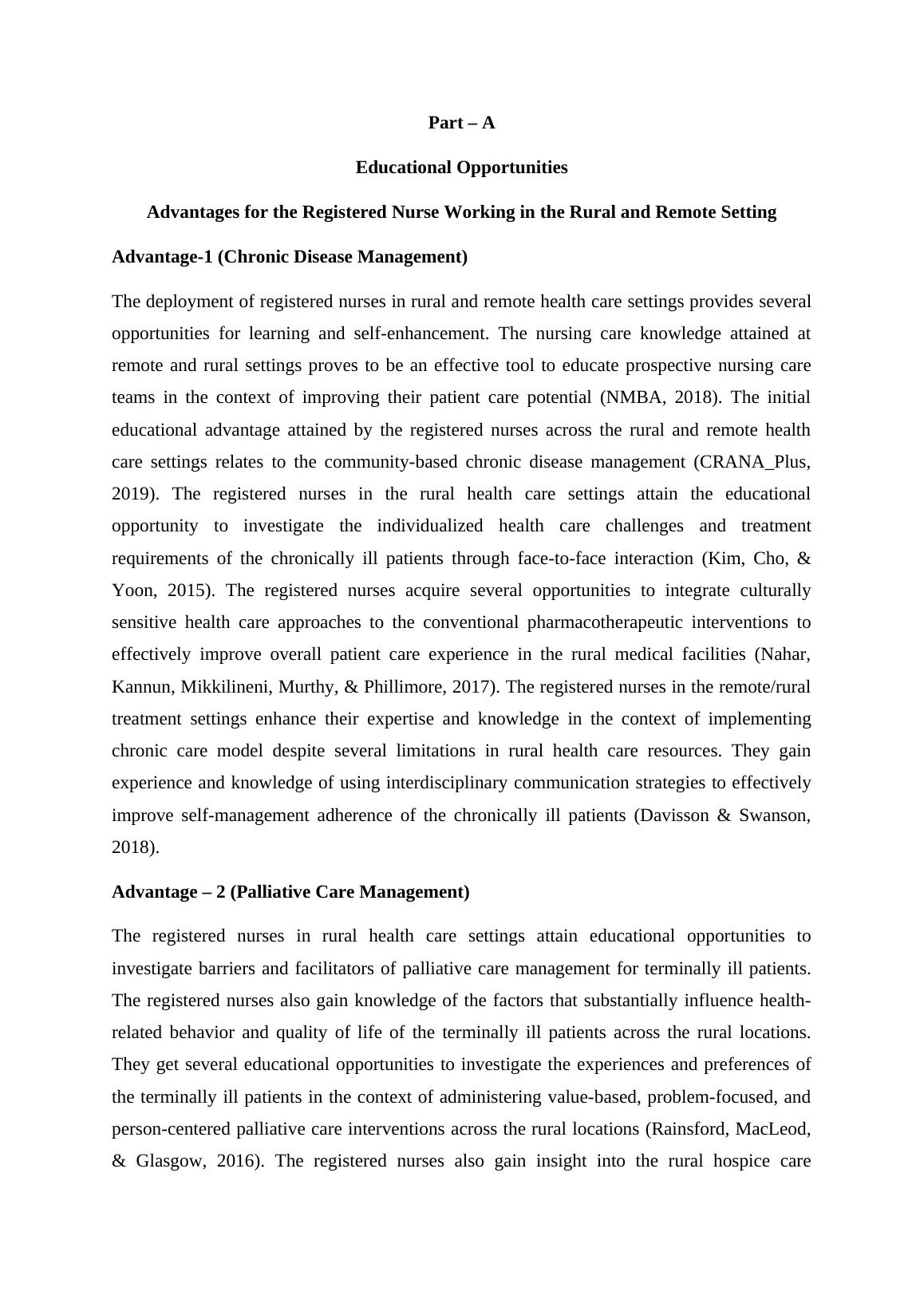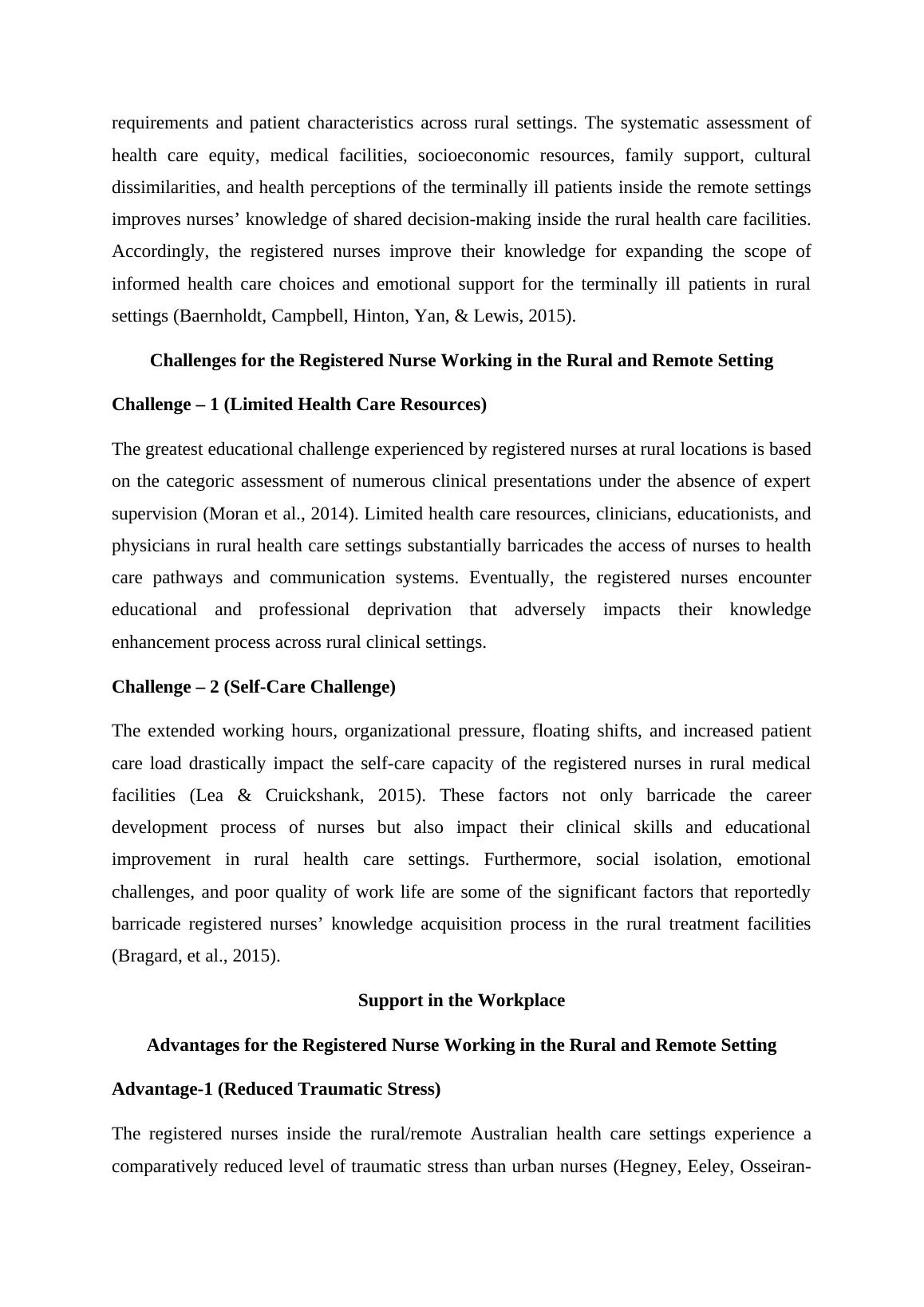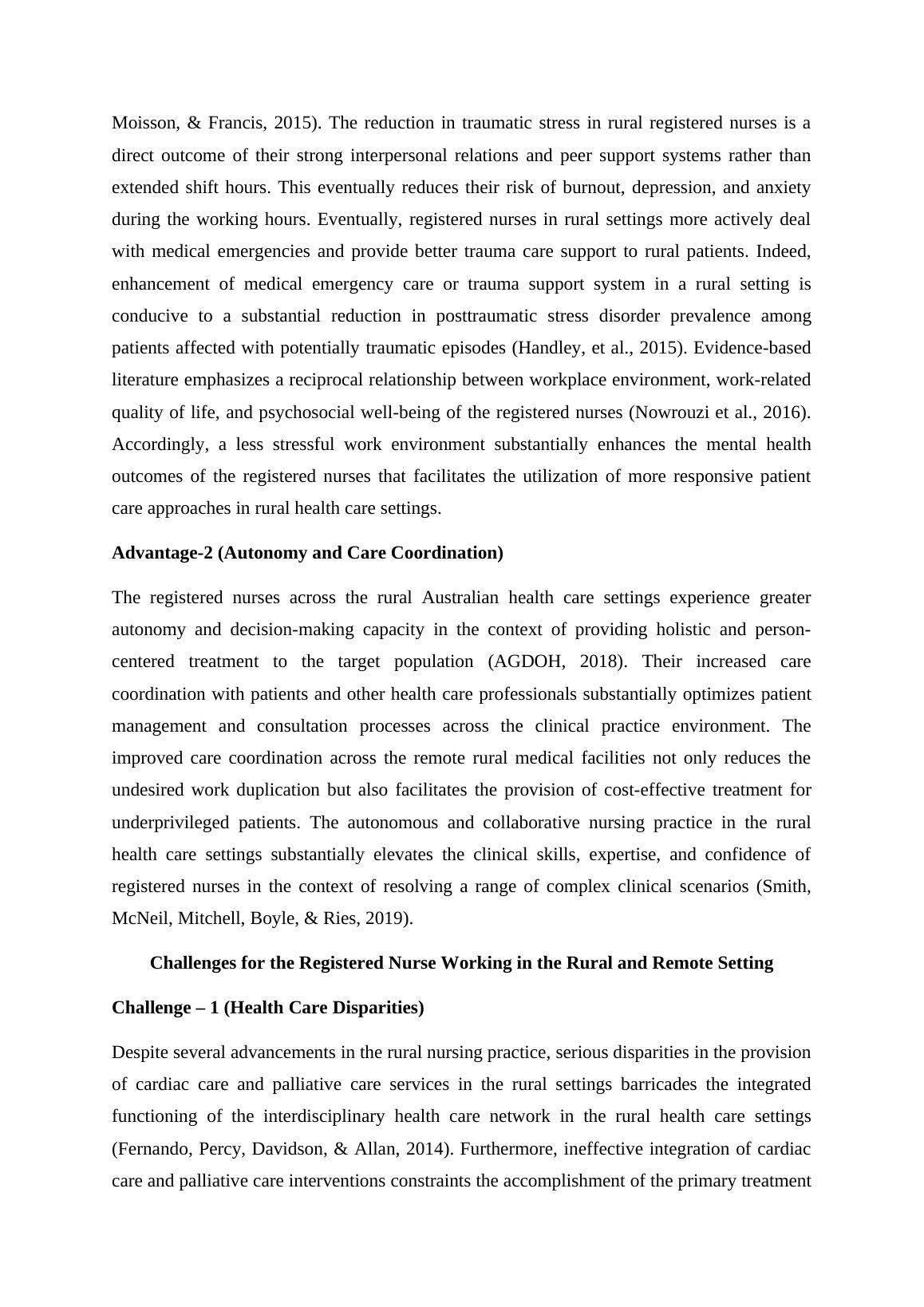Educational Opportunities and Challenges for Registered Nurses in Rural and Remote Settings
Added on 2023-01-18
10 Pages3419 Words26 Views
Part – A
Educational Opportunities
Advantages for the Registered Nurse Working in the Rural and Remote Setting
Advantage-1 (Chronic Disease Management)
The deployment of registered nurses in rural and remote health care settings provides several
opportunities for learning and self-enhancement. The nursing care knowledge attained at
remote and rural settings proves to be an effective tool to educate prospective nursing care
teams in the context of improving their patient care potential (NMBA, 2018). The initial
educational advantage attained by the registered nurses across the rural and remote health
care settings relates to the community-based chronic disease management (CRANA_Plus,
2019). The registered nurses in the rural health care settings attain the educational
opportunity to investigate the individualized health care challenges and treatment
requirements of the chronically ill patients through face-to-face interaction (Kim, Cho, &
Yoon, 2015). The registered nurses acquire several opportunities to integrate culturally
sensitive health care approaches to the conventional pharmacotherapeutic interventions to
effectively improve overall patient care experience in the rural medical facilities (Nahar,
Kannun, Mikkilineni, Murthy, & Phillimore, 2017). The registered nurses in the remote/rural
treatment settings enhance their expertise and knowledge in the context of implementing
chronic care model despite several limitations in rural health care resources. They gain
experience and knowledge of using interdisciplinary communication strategies to effectively
improve self-management adherence of the chronically ill patients (Davisson & Swanson,
2018).
Advantage – 2 (Palliative Care Management)
The registered nurses in rural health care settings attain educational opportunities to
investigate barriers and facilitators of palliative care management for terminally ill patients.
The registered nurses also gain knowledge of the factors that substantially influence health-
related behavior and quality of life of the terminally ill patients across the rural locations.
They get several educational opportunities to investigate the experiences and preferences of
the terminally ill patients in the context of administering value-based, problem-focused, and
person-centered palliative care interventions across the rural locations (Rainsford, MacLeod,
& Glasgow, 2016). The registered nurses also gain insight into the rural hospice care
Educational Opportunities
Advantages for the Registered Nurse Working in the Rural and Remote Setting
Advantage-1 (Chronic Disease Management)
The deployment of registered nurses in rural and remote health care settings provides several
opportunities for learning and self-enhancement. The nursing care knowledge attained at
remote and rural settings proves to be an effective tool to educate prospective nursing care
teams in the context of improving their patient care potential (NMBA, 2018). The initial
educational advantage attained by the registered nurses across the rural and remote health
care settings relates to the community-based chronic disease management (CRANA_Plus,
2019). The registered nurses in the rural health care settings attain the educational
opportunity to investigate the individualized health care challenges and treatment
requirements of the chronically ill patients through face-to-face interaction (Kim, Cho, &
Yoon, 2015). The registered nurses acquire several opportunities to integrate culturally
sensitive health care approaches to the conventional pharmacotherapeutic interventions to
effectively improve overall patient care experience in the rural medical facilities (Nahar,
Kannun, Mikkilineni, Murthy, & Phillimore, 2017). The registered nurses in the remote/rural
treatment settings enhance their expertise and knowledge in the context of implementing
chronic care model despite several limitations in rural health care resources. They gain
experience and knowledge of using interdisciplinary communication strategies to effectively
improve self-management adherence of the chronically ill patients (Davisson & Swanson,
2018).
Advantage – 2 (Palliative Care Management)
The registered nurses in rural health care settings attain educational opportunities to
investigate barriers and facilitators of palliative care management for terminally ill patients.
The registered nurses also gain knowledge of the factors that substantially influence health-
related behavior and quality of life of the terminally ill patients across the rural locations.
They get several educational opportunities to investigate the experiences and preferences of
the terminally ill patients in the context of administering value-based, problem-focused, and
person-centered palliative care interventions across the rural locations (Rainsford, MacLeod,
& Glasgow, 2016). The registered nurses also gain insight into the rural hospice care

requirements and patient characteristics across rural settings. The systematic assessment of
health care equity, medical facilities, socioeconomic resources, family support, cultural
dissimilarities, and health perceptions of the terminally ill patients inside the remote settings
improves nurses’ knowledge of shared decision-making inside the rural health care facilities.
Accordingly, the registered nurses improve their knowledge for expanding the scope of
informed health care choices and emotional support for the terminally ill patients in rural
settings (Baernholdt, Campbell, Hinton, Yan, & Lewis, 2015).
Challenges for the Registered Nurse Working in the Rural and Remote Setting
Challenge – 1 (Limited Health Care Resources)
The greatest educational challenge experienced by registered nurses at rural locations is based
on the categoric assessment of numerous clinical presentations under the absence of expert
supervision (Moran et al., 2014). Limited health care resources, clinicians, educationists, and
physicians in rural health care settings substantially barricades the access of nurses to health
care pathways and communication systems. Eventually, the registered nurses encounter
educational and professional deprivation that adversely impacts their knowledge
enhancement process across rural clinical settings.
Challenge – 2 (Self-Care Challenge)
The extended working hours, organizational pressure, floating shifts, and increased patient
care load drastically impact the self-care capacity of the registered nurses in rural medical
facilities (Lea & Cruickshank, 2015). These factors not only barricade the career
development process of nurses but also impact their clinical skills and educational
improvement in rural health care settings. Furthermore, social isolation, emotional
challenges, and poor quality of work life are some of the significant factors that reportedly
barricade registered nurses’ knowledge acquisition process in the rural treatment facilities
(Bragard, et al., 2015).
Support in the Workplace
Advantages for the Registered Nurse Working in the Rural and Remote Setting
Advantage-1 (Reduced Traumatic Stress)
The registered nurses inside the rural/remote Australian health care settings experience a
comparatively reduced level of traumatic stress than urban nurses (Hegney, Eeley, Osseiran-
health care equity, medical facilities, socioeconomic resources, family support, cultural
dissimilarities, and health perceptions of the terminally ill patients inside the remote settings
improves nurses’ knowledge of shared decision-making inside the rural health care facilities.
Accordingly, the registered nurses improve their knowledge for expanding the scope of
informed health care choices and emotional support for the terminally ill patients in rural
settings (Baernholdt, Campbell, Hinton, Yan, & Lewis, 2015).
Challenges for the Registered Nurse Working in the Rural and Remote Setting
Challenge – 1 (Limited Health Care Resources)
The greatest educational challenge experienced by registered nurses at rural locations is based
on the categoric assessment of numerous clinical presentations under the absence of expert
supervision (Moran et al., 2014). Limited health care resources, clinicians, educationists, and
physicians in rural health care settings substantially barricades the access of nurses to health
care pathways and communication systems. Eventually, the registered nurses encounter
educational and professional deprivation that adversely impacts their knowledge
enhancement process across rural clinical settings.
Challenge – 2 (Self-Care Challenge)
The extended working hours, organizational pressure, floating shifts, and increased patient
care load drastically impact the self-care capacity of the registered nurses in rural medical
facilities (Lea & Cruickshank, 2015). These factors not only barricade the career
development process of nurses but also impact their clinical skills and educational
improvement in rural health care settings. Furthermore, social isolation, emotional
challenges, and poor quality of work life are some of the significant factors that reportedly
barricade registered nurses’ knowledge acquisition process in the rural treatment facilities
(Bragard, et al., 2015).
Support in the Workplace
Advantages for the Registered Nurse Working in the Rural and Remote Setting
Advantage-1 (Reduced Traumatic Stress)
The registered nurses inside the rural/remote Australian health care settings experience a
comparatively reduced level of traumatic stress than urban nurses (Hegney, Eeley, Osseiran-

Moisson, & Francis, 2015). The reduction in traumatic stress in rural registered nurses is a
direct outcome of their strong interpersonal relations and peer support systems rather than
extended shift hours. This eventually reduces their risk of burnout, depression, and anxiety
during the working hours. Eventually, registered nurses in rural settings more actively deal
with medical emergencies and provide better trauma care support to rural patients. Indeed,
enhancement of medical emergency care or trauma support system in a rural setting is
conducive to a substantial reduction in posttraumatic stress disorder prevalence among
patients affected with potentially traumatic episodes (Handley, et al., 2015). Evidence-based
literature emphasizes a reciprocal relationship between workplace environment, work-related
quality of life, and psychosocial well-being of the registered nurses (Nowrouzi et al., 2016).
Accordingly, a less stressful work environment substantially enhances the mental health
outcomes of the registered nurses that facilitates the utilization of more responsive patient
care approaches in rural health care settings.
Advantage-2 (Autonomy and Care Coordination)
The registered nurses across the rural Australian health care settings experience greater
autonomy and decision-making capacity in the context of providing holistic and person-
centered treatment to the target population (AGDOH, 2018). Their increased care
coordination with patients and other health care professionals substantially optimizes patient
management and consultation processes across the clinical practice environment. The
improved care coordination across the remote rural medical facilities not only reduces the
undesired work duplication but also facilitates the provision of cost-effective treatment for
underprivileged patients. The autonomous and collaborative nursing practice in the rural
health care settings substantially elevates the clinical skills, expertise, and confidence of
registered nurses in the context of resolving a range of complex clinical scenarios (Smith,
McNeil, Mitchell, Boyle, & Ries, 2019).
Challenges for the Registered Nurse Working in the Rural and Remote Setting
Challenge – 1 (Health Care Disparities)
Despite several advancements in the rural nursing practice, serious disparities in the provision
of cardiac care and palliative care services in the rural settings barricades the integrated
functioning of the interdisciplinary health care network in the rural health care settings
(Fernando, Percy, Davidson, & Allan, 2014). Furthermore, ineffective integration of cardiac
care and palliative care interventions constraints the accomplishment of the primary treatment
direct outcome of their strong interpersonal relations and peer support systems rather than
extended shift hours. This eventually reduces their risk of burnout, depression, and anxiety
during the working hours. Eventually, registered nurses in rural settings more actively deal
with medical emergencies and provide better trauma care support to rural patients. Indeed,
enhancement of medical emergency care or trauma support system in a rural setting is
conducive to a substantial reduction in posttraumatic stress disorder prevalence among
patients affected with potentially traumatic episodes (Handley, et al., 2015). Evidence-based
literature emphasizes a reciprocal relationship between workplace environment, work-related
quality of life, and psychosocial well-being of the registered nurses (Nowrouzi et al., 2016).
Accordingly, a less stressful work environment substantially enhances the mental health
outcomes of the registered nurses that facilitates the utilization of more responsive patient
care approaches in rural health care settings.
Advantage-2 (Autonomy and Care Coordination)
The registered nurses across the rural Australian health care settings experience greater
autonomy and decision-making capacity in the context of providing holistic and person-
centered treatment to the target population (AGDOH, 2018). Their increased care
coordination with patients and other health care professionals substantially optimizes patient
management and consultation processes across the clinical practice environment. The
improved care coordination across the remote rural medical facilities not only reduces the
undesired work duplication but also facilitates the provision of cost-effective treatment for
underprivileged patients. The autonomous and collaborative nursing practice in the rural
health care settings substantially elevates the clinical skills, expertise, and confidence of
registered nurses in the context of resolving a range of complex clinical scenarios (Smith,
McNeil, Mitchell, Boyle, & Ries, 2019).
Challenges for the Registered Nurse Working in the Rural and Remote Setting
Challenge – 1 (Health Care Disparities)
Despite several advancements in the rural nursing practice, serious disparities in the provision
of cardiac care and palliative care services in the rural settings barricades the integrated
functioning of the interdisciplinary health care network in the rural health care settings
(Fernando, Percy, Davidson, & Allan, 2014). Furthermore, ineffective integration of cardiac
care and palliative care interventions constraints the accomplishment of the primary treatment

End of preview
Want to access all the pages? Upload your documents or become a member.
Related Documents
Critical Appraisal of End-of-Life Care in Acute Hospital Settinglg...
|11
|3449
|148
The Nurse's Role in Palliative Care Doclg...
|9
|1477
|48
NURBN2008 - Nursing Dementia Patient : Essaylg...
|14
|3885
|913
Rural and Remote Nurseslg...
|11
|3269
|32
Retaining Rural and Remote Area Nurses: The Queensland, Australia Experiencelg...
|7
|2064
|180
Nursing Staff’s Perception of Barriers in Providing End-of-Life Care to Terminally Ill Pediatric Patients in Southeast Iranlg...
|9
|8403
|433